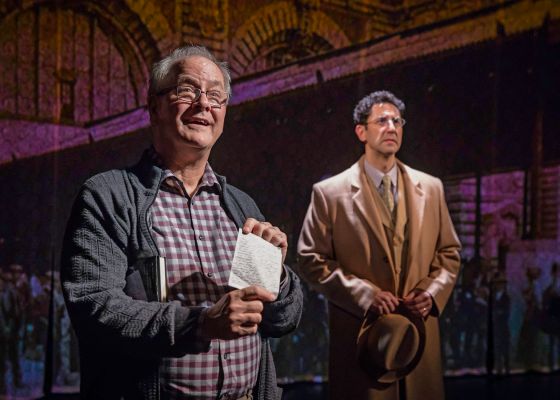
Joseph A. Hollander was a hero. We know this because his son, Richard, says so several times during his book-tour account of his father's escape from Poland during the Nazi invasion of 1939 — a laborious progress even for a member of Krakow's wealthy Jewish "five percent." Joseph's heroic journey brings him, along with his wife and an orphan boy adopted en route, to the United States by 1940. After still more trials, he enlists in the army, his language skills assigning him to Germany. While still in uniform, he meets an all-American girl destined to become his second wife and the mother of our author. Just as the latter is about to send us home hugging newly purchased volumes featuring the collected correspondence of Joseph Hollander (who is a hero, let's not forget) and his scattered kin, though, a dissenting voice in the auditorium cries foul. It belongs to Richard's own son, Craig, who upbraids his sire for trafficking in "stock footage" — familiar tropes designed to gloss over the gaps in his narrative arising from the absence of missives dispatched to occupied Europe, there to disappear amid war's ravages, leaving only those received by the expatriate brother to describe, in florid and censor-circumventing detail, the hardships suffered by those left behind. Compounding the unanswered questions, declares Craig, was Richard's reluctance to share the horrors intimated in the swastika-postmarked letters found among his deceased parents' possessions. Since Craig's field of study concerns itself with documentation of the Slave Trade, he knows well the dangers of romanticizing history. Audiences need not fear any cataclysmic reversals precipitated by closer examination, however. Joseph Hollander still emerges a good man, if not the saint his son would have us believe him to be, who struggled — yes, heroically — from his precarious sanctuary on our shores to discover the fate of his unfortunate clan. Karen Hartman, whose play is based on the real-life Richard Hollander's epistolary chronicle, is savvy enough to avoid lingering in skeptic mode, instead quickly orchestrating a return to tearful regrets — this time over lost opportunities for reuniting with survivors of the holocaust perhaps conveying news of long-lost relatives. The cast assembled under the direction of Barbara Gaines commit wholly to their characters' agony, making for emotionally satisfying performances, while also providing us ample fodder for contemplation of the many descendants of foreign-born citizens among us whose lineage continues to be shrouded, even today, in the shadows of hostile governments.
